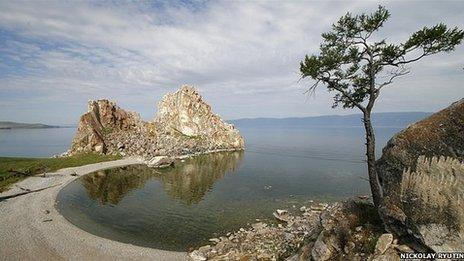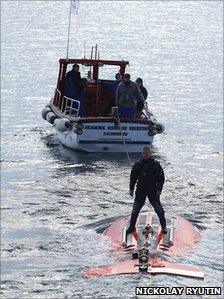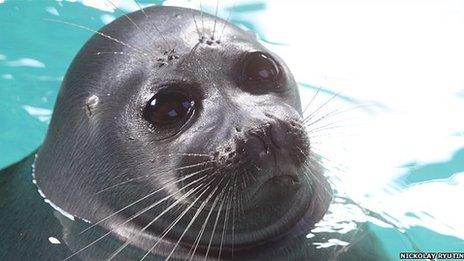UN may strike Baikal off World Heritage list
- Published
Marina Rikhvanova from the Baikal Environmental Wave organisation says she has been battling the mill for years
The UN may remove the world's deepest and oldest lake from the World Heritage list because of concerns over pollution by a Russian pulp and paper mill.
Lake Baikal holds one fifth of the world's surface fresh water and is home to many unique plants and animals.
At its 34th session about to kick off in Brazil, the World Heritage Committee will discuss the effect of the plant's wastewaters on the unique ecosystem.
Baikal was awarded World Heritage Site status in 1996.
A representative from the United Nations Educational, Scientific and Cultural Organization (Unesco) told BBC News that as a result of the mill, the lake may end up on the list of World Heritage in danger - or get struck off it altogether.
Ecologists say the mill affects more than 50% of Baikal's ecosystem.
But the business's owners deny doing any harm, and say they are helping local people survive by giving them jobs.

Lake Baikal holds one fifth of our planet's surface fresh water
The mill is located on the south-eastern shore of the Siberian lake in Baikalsk, a so-called "monotown" - meaning that its infrastructure largely depends on one single enterprise.
The Baikalsk Pulp and Paper mill first opened back in the Brezhnev era in 1966.
Ever since, Russian ecologists and NGOs have been struggling to shut it down.
The plant produces bleached cellulose. It bleaches paper with chlorine and discharges the wastewaters into Baikal, dubbed the Pearl of Siberia - one of the cleanest lakes on Earth.
Ecologists say the mill has been spewing thousands of tonnes of dioxins and other harmful by-products into Baikal.
'Unique cleaning system'
But the business's management insists that the wastewaters are clean.
"It is clear that the primary material for paper pulp production is timber. And timber is rather ecologically friendly," the plant's director, Konstantin Proshkin, told BBC News.
Mr Proshkin pointed out that the factory had a unique four-stage system of wastewater cleaning facilities.
Standing on narrow wooden bridges among rusty mechanisms that control the flow of wastewaters in and out of the endless pools filled with untreated liquid, the facility's technician, Alexey Maltsev, explained that the water was subjected to biological and chemical cleaning.
"During the bio-cleaning stage, we remove organic compounds and during chemical cleaning, we remove the lignin slurry. So the wastewaters become clean and clear.
"We respect all the necessary norms. Of course, Baikal water is unique and it is very difficult for the wastewaters to be exactly like the water in Baikal. But the lake's water cleans itself anyway and the mill's waste has a very small effect on Baikal - actually, none at all," he added.
'Economic lifeline'
Looking at the ring of mountains surrounding the plant, Mr Maltsev said that besides manufacturing a much-needed product, the mill was important in one other way.
Paper mill technician shows the BBC the plant's wastewater cleaning facilities
It was, he said, Baikalsk's economic lifeline.
"When the plant was shut down [in 2008-2009], many people were left unemployed. It was very hard to see not only how the mill was slowly dying, but the entire city as well," he said, adding that he himself was made redundant and spent more than a year without a job.
After Rosprirodnadzor (the Federal Service for Natural Resources) sued the plant in December 2007 for exceeding government standards for levels of pollutants in Baikal's water, the Russian government of then President Vladimir Putin ordered the plant to switch to a closed water cycle, cutting waste discharge into the lake.
The mill was no longer able to produce its most profitable export - bleached pulp. Thus in late 2008, the factory shut its doors and laid off more than 1,300 workers.
Baikalsk's mayor told BBC News that it was a tough time for the town.
"The entire infrastructure of Baikalsk depends on this single enterprise. It's not only jobs, but also the central heating complex that belongs to the mill and warms the town all year round," said Valery Pintaev.
"When the mill closed down, the situation became extreme for Baikalsk and its people. A town with a population of 16,000 was on the verge of collapse, it was in the dark.
"Every morning people would stay home, stay in bed. The working rhythm that existed here for the past 40 years was gone. People had no money, and this resulted in strikes, protest actions, a threat to block roads and the Trans-Siberian railway," he added.
Putin's change of heart
The mill was closed for just over a year - but everything changed in the summer of 2009, when Mr Putin came to Baikal to take a dive on board one of the two Russian mini-submarines, the Mir, that had been exploring the lake.

Russian mini-subs have taken water samples near the mill
He declared Baikal to be "in good condition" and allowed the plant to resume the open-cycle production.
Mr Putin also gave the go-ahead to waste storage on the lake's shores - including in an active earthquake zone.
Baikalsk's mayor Mr Pintaev said the town's authorities have considered replacing the mill with alternative, eco-friendly enterprises, such as further developing tourism and alpine skiing at a local mountain.
"But it is not that easy", he sighed.
"We here very much depend on the weather, and in the winter it gets very cold. This is Siberia and only people looking for extreme feelings come here.
"There is no real infrastructure, no entertainment to go to after skiing. Maybe one or two foreigners show up to look at Lake Baikal and our mountains, but it's very hard to develop full-scale tourism here," he said.
'Stain on Baikal'
Marina Rikhvanova, a biologist and renowned ecologist from Irkutsk environmental group, The Baikal Environmental Wave, has been fighting the mill for years. For her efforts to preserve Baikal, she received the prestigious Goldman environmental award.
She told BBC News that the contaminated area - the so-called stain from the mill - moves further and further towards the north.
"Near the mill, up to 80% of epicshura dies - a unique Baikal crustacean that cleans the lake. Molluscs get genetic mutations at the chromosome level and fish become disoriented and unable to find food or go to their spawning grounds," she said.
The mill might not destroy the entire lake, but the danger that unique Baikal species get displaced by other ones and the lake's ecosystem might change is all too real, added the ecologist.
Ms. Rikhvanova also said that one of the most toxic components of the mill's waste were dioxins that got into the lake's fish and then affected people and animals that ate them.
"Dioxins affect hormones and weaken the immune system. They are released through mothers' milk so the first ones to suffer are the Baikal seals' offspring and human babies of breastfeeding mothers who eat a lot of Baikal fish," said Ms. Rikhvanova.

Ecologists say dioxins in the mill's wastewaters affect Baikal seals' offspring
The plant must be closed, she said, but added that it had to be done in the safest possible way.
"It's important to safely dispose of all the toxic chemicals, as well as of the enormous slurry reservoirs located on the outskirts of Baikalsk," commented the ecologist, saying that the dark brown waste in these artificial ponds leaks into subsoil waters and then ends up in Baikal.
But she said she was certain that the old, crumbling Soviet-era structure would be eventually shut down and replaced by eco-friendly businesses.
For now though, local fishermen try to move further away from the plant - as in its vicinity, they say fish have become scarce.